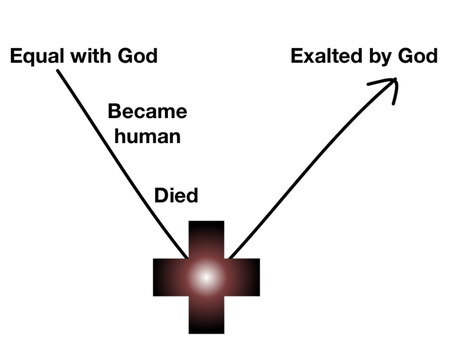I wonder how you see yourself in comparison to other people
 It is all about me. Other people exist to serve me.
It is all about me. Other people exist to serve me. Of course, very few of us would admit that this is how we see ourselves, but if I look at myself then I know that this is my default position. This is how I operate.
And in fact the world encourages us to live here. It tells us that we can build the universe around us, that we are worth it, that we must assert our rights.
And even if we are in pain - physical or emotional - then the 'I' gets even bigger, and other people get smaller. It is much easier to be gracious and humble before other people when we are feeling well! And one of the astonishing things about Jesus is that as he hangs on the cross in excruciating agony, he thinks of others - of his mother, of the criminal beside him, even of the people crucifying him.

But if that is how we are to behave to others, Paul is suggesting that we should have a different picture in our minds: we need to think of ourselves in a different way: 'in humility consider others better than yourselves' (v3)

This is radical!
It is not saying that we are to consider others as being able to do everything else better than us. There are some who will always be hopeless at mathematics and there will be some who are genii at mathematics. And it would be foolish to ask someone who is hopeless to make the calculations for a lunar landing; there will be some who will always have 2 left feet, and there are some who are incredibly gifted - and it would be foolish not to play your best team in the cup final.
Nor is it saying that we are to consider others as morally better than ourselves - although one of the interesting things is that as as we grow in our Christian life, we become increasingly aware of how sinful we are. Outwardly our actions appear good (we are great conformists), but we become increasingly alert to how corrupt our motives are. So Paul could write, 'I am the worst of sinners'. And many of the saints would see themselves as corrupt beyond imagination. I am told that on one occasion John Stott was introduced to an audience in the most glowing of terms. He thanked the person, and then said to the audience, 'But if you could see into my heart, you would spit in my face'.
And it is not saying that we need to be like Uriah Heep: 'I'm dreadfully 'umble'. Because he kept on saying it, he wasn't. Telling people he was dreadfully 'umble was actually his way of asserting himself over others.
But what Paul is saying is that we are to consider other people, irrespective of their or our gifts, irrespective of their or our achievement, irrespective of their or our age, irrespective of their or our education, not as people who are equal to us, but as people who are worthy of greater honor than ourselves.
As I said, this is radical stuff.
It is not saying that you should be a doormat and allow others to walk all over you: allowing another person to walk over you is not treating them with the respect or dignity that they deserve.
It is not saying that you should not exercise your gifts.But it is saying that you should use your life and your gifts in the service of the other, to build them up so that they become the man or woman who God created them to be. It is to be their servant, not for their sake, but for God's sake. And it is to treat them as someone who is worthy of greater honor than you.
This was a major part of Jesus' teaching.
Jesus talks about going to a banquet: He sees how people jostle for the most important places. And he says to them, 'Don't go to the highest place, because when you are asked to move down to a lower place, you will be shamed. Instead, choose the lower place'.
There was a lovely moment in Downton Abbey last week when a delegation from the village arrives at the house. Lord Grantham thinks that they are going to ask him to chair the committee setting up a world war 1 memorial. He is rather puffed up about it. The delegation arrive and instead ask Carson, his butler, to chair the committee.
And when Jesus spoke about greatness, he talks of how the world considers greatness in terms of lording it over others. But greatness in God's eyes is very different. It is about being a servant. And he uses a child as a visual aid. He puts a child in the center. He says, 'Society may consider this child to be a nobody, but you need to be people who welcome and who honor 'nobodies'.
And of course there was the occasion when he knelt down and washed his disciples feet. And he said, 'If I your Lord and Master have done this, you also should do this to one another'.
What an amazing society it would be if everyone considered the next person as worthy of more honor than themselves. If teachers considered their children in this way; if children their parents, if employers their employees, if customers treated shop keepers in such a way.
So how do we get there? How do we become people who consider others as better, as worthy of more honor than ourselves?
And here Paul gives us three steps
1. We look at Jesus and we imitate him.
'Your attitude should be the same as that of Christ Jesus' (v5)
Jesus knew who he was. He knew that he was the eternal Son of God, equal to God - but he does not take advantage of that.
It is so easy to take advantage of our position and status and wealth: to jump the queue, to get our case looked at 'sympathetically', to get preferential treatment.
If anyone could have done it, if anyone had the right to do it, it was Jesus. He could have had the most wonderful life on earth, that would have gone on for ever, with people doing exactly what he wanted, and never needing to fear that it would be taken away from him.
But he gave it all up. In obedience to God, he became a fully human person like us. He was not born in a palace but in a cowshed. He began his life as a refugee. He had astonishing powers and abilities, and yet he gave up everything in order to take up the life of an itinerant preacher, without income or home. He chose to give up the possibility of having another human person love him in a unique way or having a family. And he ended up giving his life - it wasn't taken from him, he chose to give it up - for your sake and for my sake.
'He became obedient to death - even death on a cross' (v8)
He died for us, so that we might become the men and women who God created us to be.
So look at the example of Jesus. If he was prepared to give up the riches of heaven for our sake, should we not be prepared to give up our kitsch for the sake of obedience to him and love for others?
2. We allow God to work in us to change us.
God has given us the desire and the power to live here.
V12f. 'Therefore my dear friends, as you have always obeyed - not only in my presence, but now much more in my absence - continue to work out your salvation with fear and trembling, for it is God who works in you to will and to act according to his good purpose.'
God is at work in you.
The reason that you are here today, the reason that you begin to desire to live like Jesus is because God has given you that desire. The reason that you have the power to begin to live in a God-pleasing way is because God has given you that power.
Your salvation is like a seed. God planted that seed in you and you became a Christian.
It is incredibly precious. It is the seed which will transform you so that you will become like Jesus Christ. It is the seed that will transform you to have an inner beauty and an outer radiance. It is the seed which will take you through death. It is the seed of eternal life.
Imagine if someone gives you a vase. They give it to you. It is yours. It is beautiful. You pick it up and you hold it. And then, as they walk away, they say, 'By the way, that is a Ming dynasty vase and at its last estimation it was worth $21 million'. You would hold that vase with fear and trembling.
The salvation that we have been given is far more precious than that. That is why we 'work it out' with fear and trembling.
Motyer writes in his commentary on Philippians, 'There is a fear of God of which we know all too little and which we lose at our peril – a godly fear, growing out of recognition of weakness and of the power of temptation, a filial dread of offending God. This is not the fear of the lost sinner before the Holy one, but the fear of a true child before the most loving of all fathers; not the fear of what he might do to us, but of the hurt we might do to him.'
We need to allow this salvation that we possess to be worked out in our lives, to transform us into the image of the eternal Son of God.
And practically that means listening to God and to his Spirit, and being led by the Spirit. It means spending time with him, and being obedient to him.
Paul speaks about the beginning of the work of the Spirit in the believers life in verse 1: encouragement, comfort, knowing the fellowship of the Spirit, sparks of tenderness and compassion. And it is the Spirit who is in you, who - if you are led by the Spirit - will transform us so that we become like-minded (sharing in the mind of Christ), having the same love, being one in spirit and purpose.
And it is the Spirit in us who will begin to change us so that we do not see the world from our perspective, but from his perspective. We do not see other people from our perspective, but from his perspective.
Someone said, 'The main evidence that we are growing in Christ is not exhilarating prayer experiences, but steadily increasing, humble love for other people
3. We live in hope
The man or woman who humbles him or herself before another will be exalted. Not necessarily here and now, but there and then.
It is what I call the divine V.

Therefore God exalts him
Do you wish to be vindicated, to be lifted up, to be glorified?
Then consider the person next to you. Don't look at them, because you will get embarrassed. They may be your child or boyfriend or girlfriend or husband or wife or parent or friend. They may be someone who you do not know.
Can you begin to think of them as worthy of more honor than you.
Can you begin to serve them so that they become the person God created them to be, so that they discover their God given dignity?And as you put yourself here for the sake of other people, so God will raise you here with Jesus.

